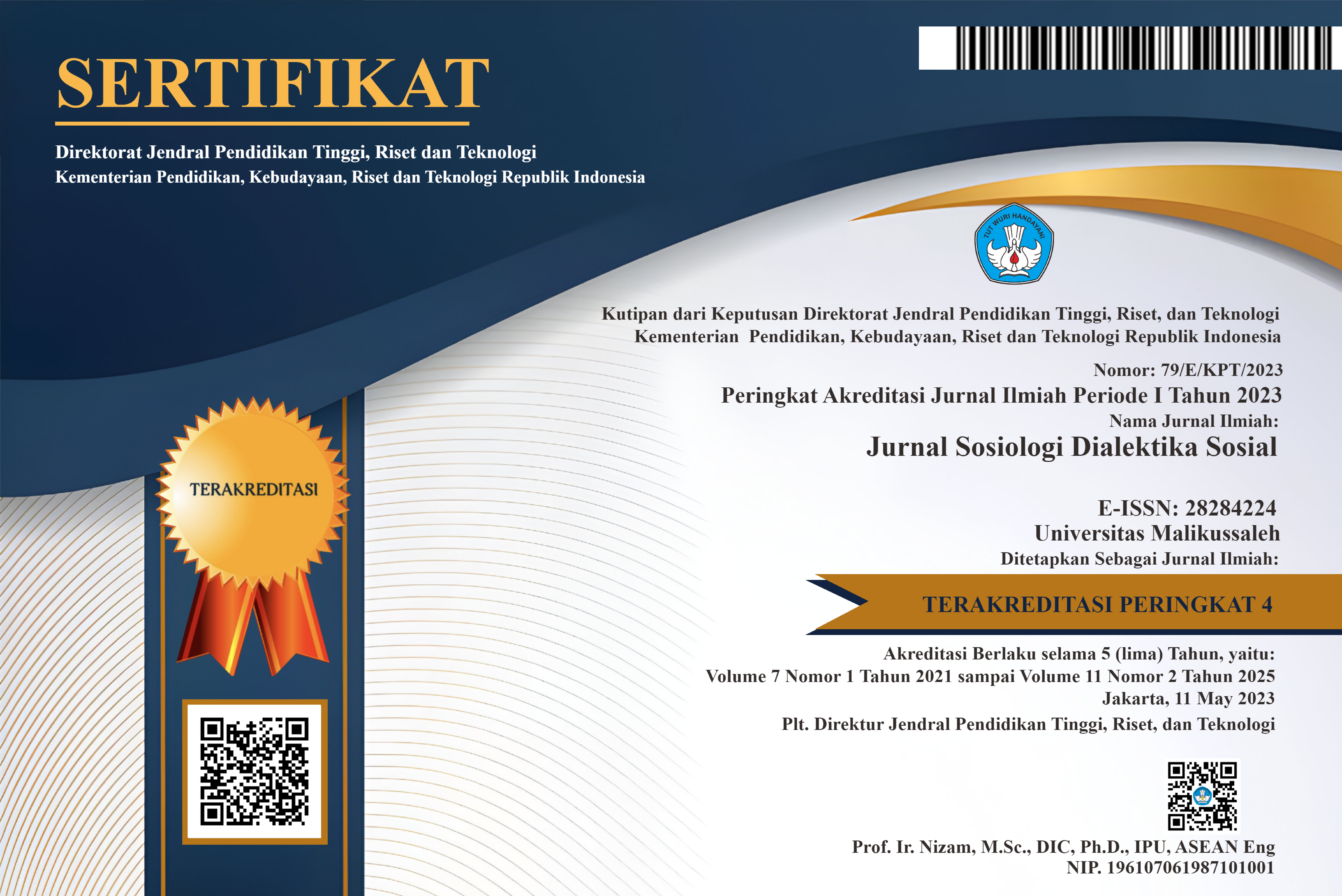ANALYSIS OF THE FACTORS FOR CHANGING THE FOREIGN POLICY OF BRITISH IMMIGRATION TO A POINTS-BASED IMMIGRATION SYSTEM
Abstract
This study aims to determine the reasons why the UK changed its immigration foreign policy. This study will explain the factors that drove the change in UK immigration policy to the Points-Based Immigration System. The research method used in this study is explanatory qualitative. This article is compiled by collecting data from books, journal articles, official government websites, and credible articles related to the topic being analyzed. After officially leaving the European Union, the UK stopped the Free Movement policy and replaced it with a new immigration policy based on points, namely the Points-Based Immigration System. This new policy, which is stricter and under the full control of the British government, is expected to reduce the high number of immigrants in the UK. After being bound by EU policies for so long, the UK is finally free to implement its own policies that are in accordance with its national interests. The findings show that changes in UK immigration foreign policy are driven by domestic factors in the form of bureaucracy, public opinion, media, interest groups, and political parties, as well as international factors in the form of global factors, regional factors, bilateral relations, and non-state actors.
Keywords
Full Text:
PDFReferences
Bidarti, A. (2020). Teori Kependudukan. Bogor: Penerbit Lindan Bestari.
Creswell, J. W., & Creswell, J. D. (2018). Research Design Qualitative, Quantitative, and Mixed Methods . Thousand Oaks: SAGE Publications, Inc.
Alunaza SD, H. (2018). Pengaruh British Exit (Brexit) terhadap Kebijakan Pemerintah Inggris terkait Masalah Imigrasi. Intermestic: Journal of International Studies, 156-170.
Cristiana, E. (2021). Perlindungan terhadap Pengungsi Asing dan Pencari Suaka. Satya Dharma: Jurnal Ilmu Hukum, 1-16.
Eidenfalk, J. (2006). Towards a new model of foreign policy change. University of Wollongong Research Online, 1-11.
Hangartner, D., & Spirig, J. (2024). Immigration and inequality: the role of politics and. Oxford Open Economics, 1481-1486.
Putra, I. D., Susanti, S., & Dewi, P. R. (2019). Dampak Referendum Brexit terhadap Kebijakan Imigran Uni Eropa di Inggris. 1-12.
Yurisman, H. (2024). Perubahan Kebijakan Imigrasi Open Door menjadi Kebijakan Point Based System Inggris di Tahun 2016-2023. 1-31.
Euro News. (2020, January 30). Brexit Timeline 2016–2020: key events in the UK’s path from referendum to EU exit. Retrieved from Euro News: https://www.euronews.com/2020/01/30/brexit-timeline-2016-2020-key-events-in-the-uk-s-path-from-referendum-to-eu-exit
The i Paper. (2019, July 25). Boris Johnson promises ‘radical’ immigration change to copy ‘Australian-style’ points system in first Commons speech. Retrieved from INews UK: https://inews.co.uk/news/politics/boris-johnson-first-commons-speech-immigration-points-based-system-318353
IOM UN Migration. (2021). IOM United Kingdom Strategy. London: International Organization for Migration .
Australian High Commission United kingdom. (2019). Australia and the UK. Retrieved from Australian High Commission United kingdom: https://uk.embassy.gov.au/lhlh/australia.html
CBI. (2020, February 26). New immigration system includes key elements of CBI campaigning efforts. Retrieved from CBI: https://www.cbi.org.uk/articles/new-immigration-system-includes-key-elements-of-cbi-campaigning-efforts/
CBI. (2025). The CBI - About Us. Retrieved from CBI: https://www.cbi.org.uk/about-us/
Global HR Lawyers. (2020, January 9). What a Conservative Government means for UK immigration law. Retrieved from Global HR Lawyers Ius Laboris: https://iuslaboris.com/insights/what-a-conservative-government-means-for-uk-immigration-law/
GOV UK. (2022, February 25). The UK's points-based immigration system: an introduction for employers (accessible version). Retrieved from GOV.UK: https://www.gov.uk/government/publications/uk-points-based-immigration-system-employer-information/the-uks-points-based-immigration-system-an-introduction-for-employers#graduate-route
Morris, A. (2025, February 12). The UK Points Based System: A Guide. Retrieved from Davidson Morris: https://www.davidsonmorris.com/points-based-system/#elementor-toc__heading-anchor-0
NHS Employers. (2024, May 16). Immigration and the skilled worker recruitment process. Retrieved from NHS Employers: https://www.nhsemployers.org/articles/immigration-and-skilled-worker-recruitment-process
NHS Employers. (2025, January 17). Impacts of the changes to the UK immigration policy. Retrieved from NHS Employers: https://www.nhsemployers.org/articles/impacts-changes-uk-immigration-policy
NHS England. (2025). What we do. Retrieved from NHS England: https://www.england.nhs.uk/about/what-we-do/
Overton, S. (2021, July 29). UK asylum policy after Brexit. Retrieved from UK in a Changing Europe: https://ukandeu.ac.uk/explainers/asylum-policy-after-brexit/
Spartacus Educational. (2020, January). The Daily Express. Retrieved from Spartacus Educational: https://spartacus-educational.com/Jexpress.htm
Stephens Scown. (2021, February 10). Conservative New Immigration Policy – Points Based Immigration. Retrieved from Stephens Scown: https://www.stephens-scown.co.uk/immigration/new-immigration-system-proposed-by-the-conservative-party/
The European Union. (2025). Easy to read - The European Union. Retrieved from The European Union: https://european-union.europa.eu/easy-read_en?wt-search=yes
The Migration Observatory. (2023, November 20). The Migration Observatory informs debates on international migration and public policy. Retrieved from The Migration Observatory: https://migrationobservatory.ox.ac.uk/resources/briefings/eu-migration-to-and-from-the-uk/
The Migration Observatory. (2025, January 25). UK Public Opinion toward Immigration: Overall Attitudes and Level of Concern. Retrieved from The Migration Observatory: https://migrationobservatory.ox.ac.uk/resources/briefings/uk-public-opinion-toward-immigration-overall-attitudes-and-level-of-concern/
DOI: https://doi.org/10.29103/jsds.v11i1.21210
 Article Metrics
Article Metrics
 Abstract Views : 13 times
Abstract Views : 13 times
Refbacks
- There are currently no refbacks.
Copyright (c) 2025 Jurnal Sosiologi Dialektika Sosial

This work is licensed under a Creative Commons Attribution-NonCommercial-ShareAlike 4.0 International License.
Diterbitkan Oleh: Program Studi Sosiologi, Fakultas Ilmu Sosial dan Ilmu Politik Universitas Malikussaleh
REDAKSI JURNAL SOSIOLOGI DIALEKTIKA SOSIAL
Gedung Program Studi Sosiologi, Fakultas Ilmu Sosial dan Ilmu Politik Universitas Malikussaleh. Kampus Bukit Indah, Jln. Sumatera No.8, Kec. Muara Satu Kota Lhokseumawe, Prov. Aceh, Indonesia.
Email: jurnalsosiologi@unimal.ac.id

This work is licensed under a Creative Commons Attribution-NonCommercial-ShareAlike 4.0 International License









.png)




